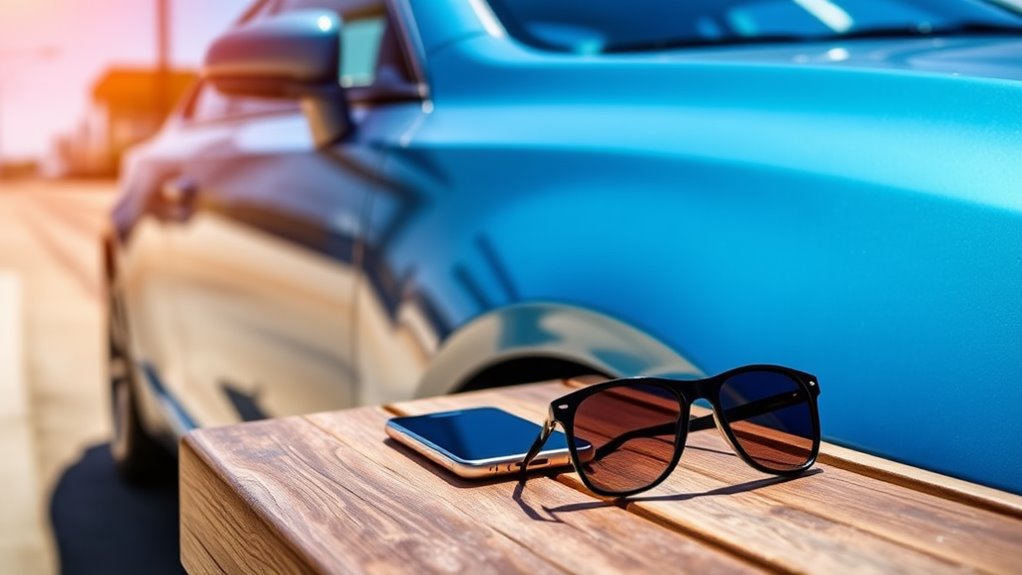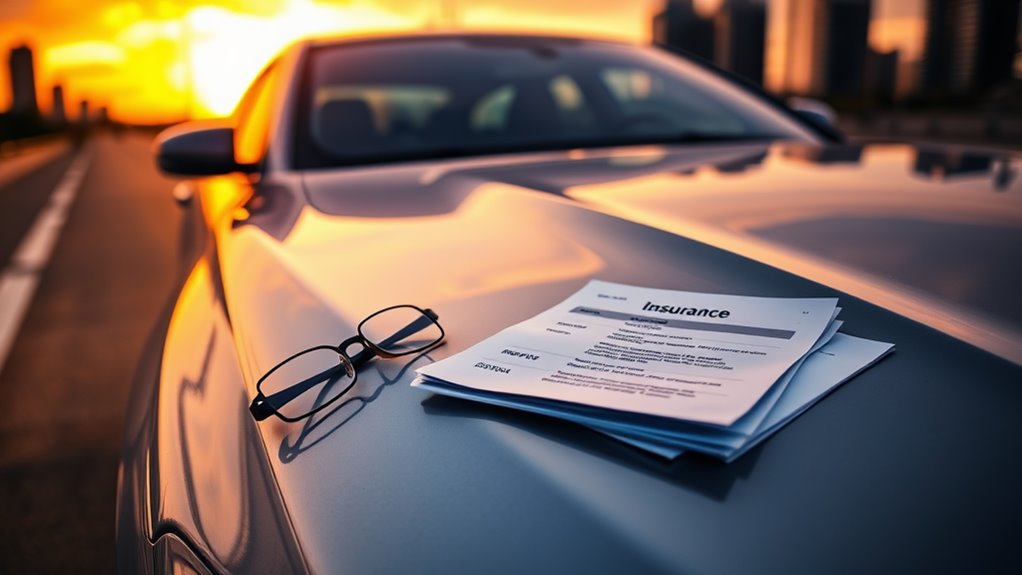Cheap Sr-22 Non-Owner Insurance
If you need SR-22 non-owner insurance, finding an affordable option is vital. This type of coverage can be confusing and costly, but understanding your needs and options can make a difference. By comparing quotes and exploring various strategies, you can secure better rates. Knowing what influences your premiums is significant in this process. Ready to uncover strategies that could save you money on your SR-22 non-owner insurance?
Key Takeaways
- Compare quotes from multiple insurers to find the most competitive rates for SR-22 non-owner insurance.
- Consider bundling SR-22 insurance with other policies to potentially secure discounts.
- Maintain a clean driving record to help lower premiums over time.
- Opt for higher deductibles to reduce monthly insurance costs.
- Seek out specialized insurers that cater to high-risk drivers for better rates.
Understanding SR-22 Non-Owner Insurance

When you find yourself needing SR-22 non-owner insurance, it’s essential to understand its specific purpose and function. This form confirms legal coverage for drivers who don’t own a vehicle, typically required after serious violations. It provides liability-only coverage for bodily injury and property damage to others, activating after the owner’s policy limits are exhausted. However, it doesn’t protect you or any vehicle you’re operating. Coverage excludes collision or thorough protection for borrowed or rental vehicles and applies solely to the policyholder, not household members. States have varying requirements for minimum coverage amounts and filing periods, often lasting three years or more. Be aware that penalties for lapses can reset your filing period. Additionally, you can obtain non-owner car insurance without owning a vehicle to meet SR-22 requirements.
Why You Might Need SR-22 Non-Owner Insurance
You might need SR-22 non-owner insurance if you’ve faced serious driving violations that require legal compliance to regain your driving privileges. This coverage is especially useful if you frequently borrow vehicles or plan to use rental cars, ensuring you meet state liability requirements. Additionally, if you have a license suspension, maintaining compliance with state laws through an SR-22 certificate can be crucial for reinstating your driving privileges.
Legal Requirement Compliance
Understanding the legal requirements surrounding SR-22 non-owner insurance is vital, especially if you’ve faced violations like DUIs or driving without insurance.
This type of insurance helps you comply with state laws to reinstate your license and avoid further penalties. Here’s what you need to know:
- Mandatory for License Reinstatement: You may need it to get your license back after certain infractions.
- State Minimum Coverage: Make sure you meet your state’s mandated minimum insurance requirements.
- Duration of Requirement: Most states require you to maintain SR-22 for at least three years.
Failure to comply can lead to additional fees and prolonged filing requirements.
Being proactive about these legal obligations is essential for getting back on the road.
Frequent Vehicle Borrowing
Frequent vehicle borrowing often leads to the need for SR-22 non-owner insurance, particularly for those who lack a personal vehicle but still require coverage.
If you often find yourself driving someone else’s car, this type of insurance can provide essential financial protection in case of an accident. It offers liability-only coverage and serves as secondary coverage, paying claims that exceed the owner’s policy limits.
Furthermore, maintaining continuous coverage can benefit you by keeping future premiums lower.
This policy isn’t needed for occasional borrowing or if you live with the vehicle owner, but if you borrow frequently, securing SR-22 non-owner insurance is a smart move to mitigate your financial risks.
Rental Car Usage
When renting a car, having SR-22 non-owner insurance can be essential for protecting yourself financially. This type of insurance provides liability coverage, which is vital when renting a vehicle.
Here are a few reasons why you might need it:
- Liability Coverage: It covers bodily injuries and property damage to others while you’re driving a rental.
- Cost-Effective: Non-owner SR-22 policies are generally cheaper than purchasing liability coverage directly from rental agencies.
- Legal Compliance: It meets state minimum coverage requirements, ensuring you comply with local laws.
How SR-22 Non-Owner Insurance Works
Although you may not own a vehicle, SR-22 non-owner insurance allows you to drive legally and meet state requirements. This type of coverage is designed for individuals who need liability insurance while driving borrowed or rented vehicles.
When you purchase non-owner insurance, your provider files an SR-22 form with the state to demonstrate that you meet the minimum liability coverage mandated by law. This insurance is especially important for high-risk drivers seeking to reinstate their driving privileges after serious violations.
Keep in mind that non-owner policies only cover damage to others’ property and don’t provide collision or extensive coverage for the vehicle you’re driving. It’s essential to maintain compliance with state regulations to avoid further penalties.
Cost Breakdown of SR-22 Non-Owner Insurance

When considering SR-22 non-owner insurance, you’ll encounter two main cost components: filing fees and policy premiums.
The average SR-22 filing fee is around $25, but this can vary by state and insurer.
Additionally, premiums are typically lower than standard car insurance, influenced by factors like your driving history and state-specific liability coverage requirements.
Filing Fees Overview
Understanding the filing fees associated with SR-22 non-owner insurance is essential for managing your overall costs. These fees can vary considerably based on state regulations and your insurance provider. Here’s a quick breakdown to keep in mind:
- Common Filing Fee Range: $15 to $25, typically a one-time charge unless your policy lapses.
- State Variability: Fees differ depending on your state’s laws and the insurer’s policies.
- Application Process: Your insurer usually handles filing the SR-22 with the DMV or motor vehicle department.
Being aware of these filing fees helps you budget effectively and avoid unexpected costs in the future.
Premium Cost Factors
Several factors influence the premium cost of SR-22 non-owner insurance, making it essential to grasp how these elements can affect your overall expenses.
On average, you can expect to pay around $576 annually, with monthly premiums ranging from $30 to $85. Key factors include your location, as state laws vary in minimum liability requirements, and your driving record; any accidents or violations can increase your premium.
Age also plays a role, with older drivers typically enjoying lower rates. To find the best deal, compare quotes from multiple insurers, focusing on those known for SR-22-friendly policies.
Maintaining continuous coverage and avoiding lapses will help keep your costs down and prevent potential rate increases.
Coverage and Liability Explained

Coverage and liability in non-owner SR-22 insurance are essential for drivers who need to prove financial responsibility without owning a vehicle.
This type of policy typically includes:
- Bodily Injury Liability: Covers medical expenses for injuries you cause in an accident, with state minimums varying.
- Property Damage Liability: Handles damage to others’ property, like vehicles or structures, subject to state-specific limits.
- Secondary Coverage: Non-owner policies provide secondary coverage, activating only after any existing primary coverage on the borrowed vehicle is exhausted.
Differences Between SR-22 and Standard Insurance
When comparing SR-22 and standard insurance, you’ll notice significant differences in coverage scope and costs.
SR-22 acts as a proof of liability coverage mandated by the state, often resulting in higher premiums due to the high-risk classification.
In contrast, standard insurance operates without the same legal requirements and typically offers more competitive pricing.
Coverage Scope Comparison
While both SR-22 and standard insurance provide essential liability coverage, their differences lie in the scope and purpose of the policies.
Here’s a quick comparison:
- Liability Limits: SR-22 adheres to minimum state-mandated limits, while standard insurance often offers higher coverage amounts.
- Coverage Types: SR-22 focuses on liability only, whereas standard insurance includes extensive and collision coverage for vehicle damage.
- Eligibility: SR-22 is specifically for high-risk drivers needing proof of insurance after offenses, while standard insurance is generally available for all drivers.
Understanding these distinctions can help you choose the right type of coverage based on your driving history and insurance needs.
Cost Differences Explained
Understanding the cost differences between SR-22 and standard insurance is essential for making informed decisions about your coverage.
SR-22 drivers typically face a one-time filing fee of $25 to $100, while standard policies don’t have such fees. Premiums for SR-22 insurance can be 20 to 60% higher, especially after DUI-related filings.
Additionally, SR-22 automatically classifies you as a high-risk driver, limiting your coverage options. You’ll also deal with more complex requirements, including state-mandated documentation and heightened renewal scrutiny.
Keep in mind that the three-year SR-22 requirement can lead to long-term premium increases, affecting your future insurance eligibility. Non-owner policies may cost less than owner policies but still exceed standard rates.
Obtaining SR-22 Non-Owner Insurance: A Step-by-Step Guide
If you need to obtain SR-22 non-owner insurance, it’s essential to follow a clear step-by-step process to confirm you meet your state’s requirements. Here’s how to proceed:
- Determine Your Eligibility: Confirm you need SR-22 filing due to a suspended license and verify you don’t live with a vehicle owner.
- Compare Quotes: Seek insurers that offer non-owner SR-22 insurance and compare costs, noting the SR-22 filing fee.
- Purchase and File: Select a provider, purchase the policy, and confirm they file the SR-22 certificate with your state’s DMV.
Common Misconceptions About SR-22 Non-Owner Insurance
Maneuvering the world of SR-22 non-owner insurance can be confusing, especially with several misconceptions surrounding it.
First, remember that an SR-22 isn’t insurance; it’s a certificate proving you have the required insurance. Many believe you need to own a vehicle to get a non-owner SR-22 policy, but that’s not true.
An SR-22 is a certificate, not insurance, and you don’t need to own a vehicle for a non-owner policy.
This coverage only protects against liability for bodily injury and property damage, not extensive or collision damages. Additionally, it’s required for various infractions, not just DUIs.
If you cancel your policy, you must verify with the DMV that your SR-22 requirement has ended. Understanding these misconceptions will help you navigate the process more effectively and avoid potential pitfalls.
Tips for Finding Cheap SR-22 Non-Owner Insurance

Finding affordable SR-22 non-owner insurance can be challenging, but with a few strategic approaches, you can secure the best rates. Start by comparing quotes from multiple insurers to find the most competitive options.
You should also consider the following tips:
- Bundle Policies: Combining your SR-22 insurance with other types can lead to discounts.
- Maintain a Clean Record: A spotless driving history helps lower premiums considerably.
- Choose Higher Deductibles: Opting for higher deductibles can reduce your monthly costs.
Additionally, look for specialized insurers who cater to high-risk drivers, as they may offer better rates.
Understanding your state’s specific requirements will also aid in finding affordable coverage.
Maintaining Your SR-22 Non-Owner Insurance Policy
Maintaining your SR-22 non-owner insurance policy requires diligence and an understanding of your state’s regulations.
First, confirm you meet the minimum liability coverage mandated by your state, as these requirements differ. Typically, you must maintain this coverage for at least three years, so be prepared for the commitment.
Confirm you meet your state’s minimum liability coverage requirements and be ready to maintain it for at least three years.
Your insurer needs to file the SR-22 form with the DMV on your behalf, and any lapse in coverage could require re-filing, extending your obligation.
Keep in mind that SR-22 policies can lead to higher premiums, but maintaining continuous coverage can result in long-term savings.
As a reminder, confirm you don’t own or have access to a vehicle, as this is vital for maintaining your non-owner status.
Frequently Asked Questions
Can I Switch Insurers While Holding an SR-22?
Yes, you can switch insurers while holding an SR-22 in California. Just guarantee you maintain continuous coverage and file a new SR-22 with your new insurer to avoid license suspension or compliance issues.
Does My SR-22 Affect My Credit Score?
Your SR-22 acts like a double-edged sword; it doesn’t directly impact your credit score, but high premiums can lead to missed payments, harming your credit. Stay vigilant with payments to protect your financial health.
What Happens if I Cancel My SR-22 Policy?
If you cancel your SR-22 policy, your insurer files an SR-26 form, alerting the state. This typically results in license suspension, fines, and potential reinstatement fees until you secure new SR-22 coverage.
Can I Drive Other Vehicles With an SR-22?
Absolutely, you can drive other vehicles with an SR-22! Just remember, if you’re borrowing or renting, you’re covered. But, steer clear of household member vehicles; those aren’t included in your policy.
Will My Rates Increase After the SR-22 Period Ends?
Your rates might decrease after the SR-22 period ends, but they won’t immediately return to pre-SR-22 levels. Maintaining a clean driving record is essential for potential reductions in your insurance premiums.
Conclusion
In the journey to secure affordable SR-22 non-owner insurance, remember that knowledge is your compass. By comparing quotes, bundling policies, and exploring specialized insurers, you’ll navigate the often murky waters of high-risk coverage with confidence. Don’t let misconceptions steer you off course; stay informed and proactive. With diligence, you can find a policy that meets your legal obligations without breaking the bank, ensuring peace of mind as you hit the road once again.



